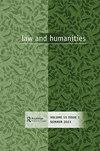英国现代戏剧中的法律戏剧
IF 0.2
Q3 LAW
引用次数: 0
摘要
《现代英国戏剧中的法律戏剧》是一部“关于法律、政治和历史相互作用”的令人愉快的读物(1)。这是第一本在戏剧背景下评估这种多重关系的书。然而,我们对相互参与的法律和政治有一定的熟悉;批判性法律研究学者探讨了它们之间的联系。这一批学者显然持政治立场,特别关注法律教育。打开法律的包装意味着向未来的律师解释,它首先是“一种用于政治目的的政治工具”(12)。法律形式主义仍然在法律和影响它的非法律变量之间划清界限。作为法律学者,我们的“法律工作”是教学生一种明确的心态。除了一系列“行为习惯”,这些习惯将“让他们很好地适应职业律师的生活”(13),我们向他们解释说,法律对环境的封闭确保了其中立性。关键的法律地理学家Nicholas Blomley将这种封闭称为“包围”,因为它构建了“一个边界,在这个边界内,互动或多或少独立于周围的环境”。Bracketing充满了价值观和意识形态动机。意识形态一旦被载入法律文本,就会被精心设计,以固定其法律客观性,并激发学生的“尊重”和“质疑态度”,使“法律等级制度”能够“代代相传”(13)。在《法律的游戏》中,跨学科的研究与法律自治的理念背道而驰。沃德呼吁律师在我们政治社区的生活中做出更紧密的承诺。他认为,必须结合具体情况对法律手段进行评估,考虑到充分理解法律手段需要充分理解影响法律手段的所有变量。法律并不是一个空箱,装着“匿名的权威和权力”。恰恰相反:外部因素务实地丰富了它的含义。我对沃德论点的理解是,他还旨在超越法律与权力之间的主流关系。由于它通常关注意识形态是如何通过法律编码的,因此它仍然代表了一种括号形式,在这种形式中,法律与权力的相互作用是通过含义来传达的,即对法律含义的语言解释,它只是问“一句话在其特定背景下暗示了什么,发件人的“议程”是什么。“沃德对法律的不同想象感兴趣,这体现在前半个世纪的英国戏剧中”(1)。现代戏剧使他能够进行批判性的、跨学科的和情境性的表演本文章由计算机程序翻译,如有差异,请以英文原文为准。
The Play of Law in Modern British Theatre
The Play of Law in Modern British Theatre is an enjoyable read ‘about the interplay of law, politics and history’ (1). It is the first book that assesses this multiple relationship within the context of theatre. Yet, we have a certain familiarity with law and politics engaging with each other; their connexion has been explored, amongst others, by critical legal studies scholars. Taking a clearly political position, this strand of scholarship was particularly concerned about legal education. Unpacking the law meant explaining to prospective lawyers that it is, first and foremost, ‘a political instrument wielded to political purposes’ (12). Legal formalism still draws a divide between the law and the non-legal variables that influence it. As legal scholars, our ‘law job’ is to teach students a welldefined state of mind. Besides a series of ‘behavioural habits’ that will ‘equip them nicely for life as professional lawyers’ (13), we explain to them that the closure of the law to contexts secures its neutral character. The critical legal geographer Nicholas Blomley terms this closure ‘bracketing’, since it constructs ‘a boundary within which interactions take place more or less independently of their surrounding context’. Bracketing is value-laden and ideologicallymotivated. Once enshrined in legal texts, ideology is carefully crafted to fix its legal objectivity and inspire ‘deference’ and ‘unquestioning attitude’ in students, allowing ‘the legal hierarchy’ to perpetuate ‘itself, from one generation to another’ (13). In The Play of Law, interdisciplinary research runs counter to the idea of the autonomy of the law. Ward calls for lawyers’ closer commitment in the life of our political communities. He argues that legal devices must be assessed in context, taking into consideration that their full understanding entails a full understanding of all the variables that affect them. The law is not an empty box incapsulating ‘anonymous authority and power’. Quite the opposite: external factors pragmatically enrich its meaning. My understanding of Ward’s argument is that he also aims to go beyond the mainstream relationship between law and power. As it usually focuses on how ideology is encoded through law, it still represents a form of bracketing, where the law-power interplay is conveyed by means of implicatures, i.e. a linguistic interpretation of the meaning of the law which merely asks ‘what is hinted at by an utterance in its particular context, what the sender’s “agenda” is.’ Ward is interested in a different visualisation of the law, which manifests itself in British drama as written and ‘performed over the previous half-century’ (1). Modern theatre allows him to stage a critical, cross-disciplinary, and contextual
求助全文
通过发布文献求助,成功后即可免费获取论文全文。
去求助
来源期刊

Law and Humanities
LAW-
CiteScore
1.00
自引率
0.00%
发文量
21
期刊介绍:
Law and Humanities is a peer-reviewed journal, providing a forum for scholarly discourse within the arts and humanities around the subject of law. For this purpose, the arts and humanities disciplines are taken to include literature, history (including history of art), philosophy, theology, classics and the whole spectrum of performance and representational arts. The remit of the journal does not extend to consideration of the laws that regulate practical aspects of the arts and humanities (such as the law of intellectual property). Law and Humanities is principally concerned to engage with those aspects of human experience which are not empirically quantifiable or scientifically predictable. Each issue will carry four or five major articles of between 8,000 and 12,000 words each. The journal will also carry shorter papers (up to 4,000 words) sharing good practice in law and humanities education; reports of conferences; reviews of books, exhibitions, plays, concerts and other artistic publications.
 求助内容:
求助内容: 应助结果提醒方式:
应助结果提醒方式:


